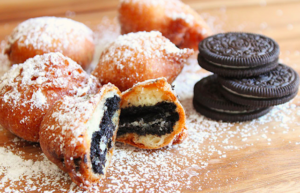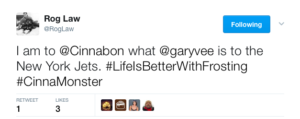Is there anything more frustrating than consistently nailing your diet day in and day out only to be hit upside the back of the head with nagging thoughts of pizza, ice cream, donuts, and cheeseburgers?
Food cravings are the mosquitoes of dieting.
It’s like going to the beach and getting attacked by an unrelenting swarm. One mosquito here and there isn’t so bad, but if you’re getting bitten by a hundred of them, it becomes a problem.

And have you ever noticed how it’s never a stalk of broccoli or a handful of kale that you’re silently lusting after? Why does it always have to be the highly processed stuff with so much sugar in it that even the Kool-Aid man is concerned with contracting Type 12 Diabetes?
So, what exactly is going on here?
Well, as someone who’s a firm believer in adopting healthier habits as opposed to going all in on a crash diet, I’d say it starts with developing behaviors that don’t cause us to crave foods in the first place.
Perhaps you’ve heard the phrase, “What you resist, persists.”
In other words, as soon as someone tells me I can’t have something, the curious and rebellious side of me kicks in:
“Why not?”
“What’s in it?”
“What will it do?”
“Why should I listen to you?”
I’m like a snot-nosed toddler with my incessant questioning. And if I don’t get an answer that satisfies my curiosity, I’m going to feel as though my freedom is being threatened and immediately plan my escape route.
No one likes to be told what to do. Myself included. I’m an adult for crying out loud. So if you tell me not to put my hand in the cookie jar, you had better believe as soon as you leave the room I’m eating the damn cookie.
So there.
Forbidden fruit tastes so much sweeter
Okay, so what if we know what we’re doing is actually not what we truly want and we’re beating ourselves up afterward?
Let’s get back to that behavior thing.
If you’re a regular reader of mine (you can sign up for more awesome stuff like this here) then you know I talk A LOT about human psychology and how it plays a powerful role in successful transformations.
Without understanding the WHY behind the things we struggle with (overeating, chronic dieting, lacking motivation, etc.), we’re merely guessing at a sustainable solution. And I don’t know about you, but “winging it” and hoping for the best isn’t a fat loss strategy I’m interested in. I want results. And I don’t want to waste my time traveling down dead end roads.
To dive into the psychological side of this a bit more, let’s touch on the science behind WHY you’re more likely to buy fatty foods when labels warn against them and WHY when you’re told to ignore the fried Oreos at a state fair, those thoughts have a sneaky way of consuming you.

In an interesting study conducted by psychologist, Daniel Wegner, the participants were instructed not to think about a white bear. They were told to spend the next five minutes blurting out loud whatever came to mind and ringing a bell if they thought of the white bear.
The result?
They couldn’t help themselves from thinking about the white bear. Every 1-2 minutes they were ringing the bell. As soon as the seed was planted to watch out for the white bear, they were doomed for failure. Their brains wanted to help them out by reminding them to monitor the very thing they were trying to avoid.
And so it goes with gummy bears, cheesecake, and whatever other edible demons haunt your taste buds. If you’re told you can’t have it, you’re more inclined to keep an eye out for it.
Curiosity
Another behavioral obstacle we can’t sweep under the rug is our natural inclination to know what’s on the other side. When certain foods are forbidden or discouraged, it’s hard not to become intrigued.
Experiments have revealed that violent movies or video games with warning labels are more likely to be sought after. The same is said of banned books in schools. It’s a mystery to be unraveled: we want to know why it’s on the naughty list.
This is explicitly why I don’t use labels with my clients to identify different types of foods. No food is “bad” or “good.” It’s just food. And food has no moral meaning attached to it unless we decide to give it one.
Freedom to eat what you want when you want it means you’re more likely to eat intuitively as opposed to white-knuckling your way through a dinner party with foods you’ve labeled off limits.
Emotional cravings
I’m a big believer in the concept that what we eat on Monday directly impacts our relationship with food on Saturday. Cravings are most often the result of feeling deprived. If we’re eating the same six foods Monday through Friday, by the time Saturday rolls around that cheeseburger at your friend’s BBQ doesn’t stand a chance. Uncomfortably full or not, you’re going to eat the thing until it’s gone.
We can’t dismiss the vital role food plays on our emotions. It’s everywhere. Food represents holidays, birthdays, weddings, seasons, cultures, etc. We even use it as a tool to self-medicate and soothe ourselves. If we’ve had a rough day at work, it’s not uncommon to hit happy hour to unwind and release stress with our friends.
Bored and tired? No problem. Potato chips will be there to keep your hands busy. Feeling rejected and lonely? Not anymore. Ice cream has your back.

Cravings arise to signal emotional needs. This is why certain foods satisfy our craving better than others. If you’re homesick during the holiday season, you’ll be more inclined to crave those famous cookies your Grandma makes every Christmas over a store bought apple pie.
Environmental cravings
We can’t discuss emotional cravings without acknowledging the physical cues our environment uses to remind us to overeat.
It’s not unusual to drive past your favorite Mexican place on the corner and suddenly feel the urge to demolish a six-pack of tacos in one sitting. Environmental triggers, like smelling or seeing certain foods, can send our cravings into a frenzy. Something we weren’t even thinking about two minutes ago has the power to become an instant obsession if it hits the right trigger points.
How many times have you walked past a Cinnabon (I’m looking at you Rog Law) in your local airport or mall, smelled the rich, sweet aroma of cinnamon rolls and hypnotically claimed you must have one or someone is likely to get poked in the eyes?

So what’s the solution?
As someone who has discussed their own embarrassing stories with emotional eating, I’ve learned a few things along the way.
Ideally the most effective way to break yourself from this cycle is to stop reinforcing it altogether.
Easier said than done, right?
So is the answer to slap the donut out of your hand mid-bite? Well, yes. But the notion that we’re never going to eat sugar again is completely unrealistic and inconceivably short-sighted.

So, what can we do?
Practice controlled eating. And yes, it requires a lot of practice. It’s not something that just “clicks” in a matter of days; you have to be determined and willing to keep at it. And it may take a long time, but you will get there if you persevere and don’t give up.
In a nutshell: it has to become a habit.
Like most of our behaviors, our desire for certain foods are often the result of our daily routine. And habits, by definition, aren’t really things we think about. They’re effortless. They’re the path of least resistance, so it’s no surprise we’re not always mentally aware of the decisions we’re making along the way.
It usually looks a little something like this:
It’s Friday! Whew. End of the work week. Happy hour! Time to eat, drink, and be merry.
Oh, well hello there, Sunday. Football watching day. Bring on the hot wings and beer!
What’s that you say, Tuesday? The 3pm work day slump has you feeling tired? You’d better go get your hands on a Snickers bar at the vending machine. We wouldn’t want you to fall asleep on your desk again.

I know I’ve been guilty of this in the past. Just recently I talked about how an old childhood ritual pop-up when I went home to visit my Mom:
“I kid you not; I may as well have been Pavlov’s dog, because as soon as I hit the threshold, I mindlessly walked right over to the fridge and began assessing its contents. Hungry or not, it would have made no difference. This was a thirty year-old habit at play and I was so unaware of what I was doing that I may as well have been a robot.
As a kid, coming home from school and immediately digging through the fridge had become such a part of my daily routine, that here I was thirty years later continuing to reinforce the same patterns that got me here in the first place.”
But making this discovery didn’t happen over night. We all have our individual cues, triggers, and routines. It takes time to observe and become aware of these practices before we’re ever able to troubleshoot and then adjust them. The end goal, of course, being that we either choose a healthier alternative or skip the ritual altogether.
And it starts with looking inward.
Am I really hungry? Do I want something to eat because I’m feeling anxious? Am I bored? Tired? Thirsty?
Be the detective of your own body.
Or, you could try changing your routine entirely. Maybe your hang-up is hitting the drive-thru and grabbing a McDonalds blizzard on your way home from work every day.
Instead, you could practice traveling a different route to avoid the McDonalds, or substitute the blizzard for a lower calorie ice cream cone. And then you could slowly transition to getting the ice cream cone every other day, and then eventually every three days, etc.
It’s a band-aid
At the end of the day, whether you’re eating because you’re craving certain foods — you’re eating because there’s a deeper issue that needs your attention.
That’s all emotions are, by the way — little body cues that let you know that there’s something inside of you that needs a little maintenance. And despite repetitive efforts, trying to drown it in your favorite alcohol of choice it isn’t an effective strategy. Trust me, I’ve tried.
So what do we do?
Well, we learn to do be comfortable with the uncomfortable. We look inward. And then after careful observation. We be compassionate with ourselves and then we slowly begin to face the issue head-on.
Before we can make these uncomfortable feelings go away, we have to identify was caused them in the first place. And then look for a way to soothe ourselves without all of the high calorie ice cream.

If you’re caught in the middle of a binge or craving, try to find a temporary distraction until you’ve had a chance to let the dust settle. Maybe it’s going for a walk, reading a book, or calling a friend.
Arm yourself with that distraction until your cravings have calmed down and you’re ready to address the core of what’s causing your emotional discomfort.
Is it your job? Your relationship? Your kid’s incessant need to say, “Mom, mom, mom, mom, mom…” while banging on the door when you’re in the bathroom?
The goal is to find a way to remove yourself from the stressful situation and settle into a healthier way to manage the anxiety.
Practice eating in a way where you don’t feel deprived of your favorite foods, but you’re also not eating everything in sight. Make sure you’re eating ALL the foods you love, but stopping before you get too full or uncomfortable. And then wait until you’re hungry to eat again.
This takes conscious effort. It’s not a quick-fix or something that you’re going to master right away. You have to be aware of your triggers, cues, and routines before you’ll have any success in changing them. Monitor your behavior in high-stress situations. And then assess how you can adapt those to be more manageable in the future.
But above everything else, be prepared to practice patience and self-compassion. And failure. A lot of failure. Expect it. Plan for it. Fail a thousand times, but whatever you do — don’t give up. Keep going and with time, it will get easier.
If you feel like you need some additional help or just want to have a chat with someone who gets it, contact me. You don’t have to continuing living in shame. There’s nothing wrong with you. You’re doing the best you can. And that’s good enough.
